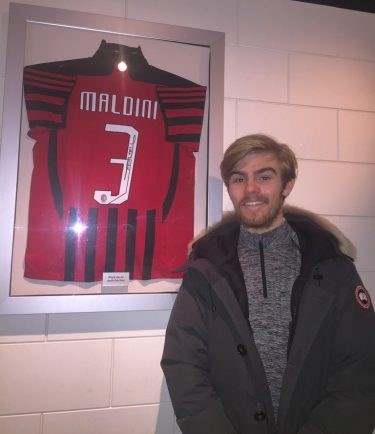A selection of leading sports journalists gathered in Manchester at the beginning of September for a week of debate at the annual Football Writing Festival. Max Carlyle, a BA (Hons) Football Business & Media student at UCFB Etihad Campus, attended the Festival and enjoyed a range of talks on the hottest topics – including the World Cup, the managerial merry-go-round and how to break into the industry – with some of the world’s most popular and respected football and sports journalists.
Max was ever present over the six days, and reported back on highlights for each session. Read on to find out more…
Follow Max on Twitter.

The fifth annual Manchester Football Writers Festival kicked off with the esteemed journalist quadrant of Jonathan Wilson, author of The Barcelona Legacy, Miguel Delaney, chief football writer at The Independent, Rory Smith chief football correspondent at The New York Times, and Jonathan Northcroft, correspondent at The Sunday Times and editor of quarterly magazine The Blizzard.
Sitting in the National Football Museum in Manchester, it was fitting that the panel should open the discussion on the hot topic of Jose Mourinho’s start to the 2018/19 Premier League season with Manchester United.
From turning up to press conferences half an hour early to impassioned rants demanding respect for his past achievements, Mourinho’s outlandish conduct on top of two losses from United’s opening three league games led The Blizzard to suggest that Mourinho’s third season as United boss could be ill fated. Both Wilson and Northcroft were in agreement that Mourinho’s Old Trafford tenure may come to an end before the Christmas period, stating the hierarchal disconnect between Mourinho and executive vice-chairman Ed Woodward has seen Manchester United suffer as a consequence.
Miguel Delaney was quick to compare the episodes of this season to Mourinho’s disastrous 2015/16 season at Chelsea – when he left the club in 16th place at the time of his departure despite winning the league title the previous season. Delaney said: “Perhaps it’s unravelling a lot quicker than 2015/16 at Chelsea. If they struggle and fail to win against Burnley on Sunday, all bets are off.” (United went on to win that game 2-0).
Smith went on to prompt the question that despite his revered achievements at Porto, Chelsea and Inter Milan, do the frequent emotional outbursts and the cold treatment of certain players, such as Anthony Martial, make Mourinho less employable? Northcroft responded saying: “Look at Marco Silva at Everton. Despite his fallible history in English football, fans embrace a manager who brings a feel good factor.”
Turning to the audience for some questions, the panel were quizzed on Mourinho’s representation in the media and how his charming image from 2004/05 has evolved from an anti-hero to a villain, and the possibility that it is still too early in the season to call judgement. Wilson answered: “Maybe it’s not a crisis, but it’s a big, big problem. They’ve lost two games already this season and City only lost two in the entirety of last season. I don’t see United going on a run of 12 wins in a row. It’s important to add the context of Mourinho’s history.” Smith backed up this view: “Mourinho is 55 now, he’s in elder statesman territory and should behave better.”
The debate also touched on whether or not United is as dysfunctional brand, and if a director of football may solve their woes. Having accounted for half of the event – or 45-minutes – Smith jokingly confirmed “this definitely concludes the media are not obsessed with Jose Mourinho.”
The second half of the evening took on a more light-hearted and comical discussion, opening with the favourite footballing nemesis of each member of the panel. Wilson opted for Celtic man John McPhail, Northcroft going for fellow compatriot Graeme Souness. Delaney, after deliberating the entire Uruguay national team (except Edinson Cavani), chose “capitán, líder, leyenda” Sergio Ramos, as Smith went for Juventus icon Paolo Montero.
The panel was asked a range of interesting questions, including “what is the most surreal thing you’ve seen in football?” The best answer undoubtedly came from Wilson, who explained how he broke the news of Michael Jackson’s death to Gerard Houllier and Christian Karembeu in South Africa. Appropriately, one of final questions was on the evolution of journalism in the digital age. A conclusion was drawn that clubs now see themselves as exclusive content producers, and, being global entities, clubs make it harder for independent media outlets.
This was an extremely insightful opening day of the Manchester Football Writing Festival, with plenty more to come later in the week.
















